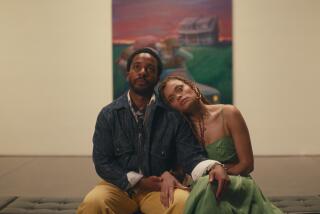MOVIE REVIEWS : FATHER-SON TIME: TWO VERSIONS : ‘The Good Father’
- Share via
As “The Good Father” (at the Westside Pavilion) unfolds, traveling over much the same ground as “Kramer vs. Kramer” but more deeply and more dangerously, we realize the risks the film makers are running. Anthony Hopkins’ Bill Hooper, a London publishing executive, bereft and seething after a separation that was his idea, is a hard man to empathize with, even if one knows intimately the pain he feels at losing his 6-year-old son.
What he does about discharging that anger is emotionally understandable but morally contemptible: He barges into the divorce case of a friend, schoolteacher Roger Miles (Jim Broadbent), whose wife has left him for another woman, goads him into more and more extreme measures and even hires a pricey, unscrupulous barrister for him (Simon Callow, the splendid vicar of “A Room With a View,” in a complete change of pace).
Most of the fury Hooper feels comes from his own stance as a passionate advocate of women’s rights in the ‘60s, the sort “who’d argue feminism with women.” Now, having instigated his own separation and having had to watch while his wife righted her life and brought another man into “their” house, he feels doubly betrayed.
Director Mike Newell, whose control and style made “Dance With a Stranger” burn like dry ice, again refuses to sentimentalize an iota of his story, adapted by Christopher Hampton from a novel by Peter Prince. (In this respect, it is unlike “Kramer vs. Kramer.”)
The director will investigate every aspect of Bill Hooper, including his ambivalence about his little boy, who has so “drained” him of every drop of love that he has frightful nightmares of attacking the child who so stirred these emotions in him. The director will make Hooper’s rage enormous, volcanic and almost palpable in this remarkable performance by Hopkins. But he will not make him heroic, or even terribly principled.
So we are left to admire what we cannot exactly warm up to--a bravura performance in a laceratingly honest and upsetting film, overshadowing even the perfect mosaic of performances that make up the movie.
For some reason, “The Good Father” feels as slightly out of date in America now as “Dancing in the Dark” did, with its portrait of the house-proud, “perfect” wife who lives only through her husband. The questions of “The Good Father” (rated R for language and adult themes)--separation, divorce, visitation rights, the emotional cat’s cradle of family bonds that cannot be cut no matter what a court decides--still rage. But their claim on our outraged attention is a little past--another element to distance us from the film.
The two wives’ roles remain a little fuzzier than the clear-cut portraits of the men. Best of the women’s performances are Miriam Margolyes as an outraged feminist barrister and Joanne Whalley, who (for reasons we never entirely understand) begins a love affair with the tortured Hooper, considerably her senior and not particularly giving in matters romantic.
There can be no complaints, however, about Hopkins’ unsparing, darkly brilliant performance. On screen in every scene, he invests the role with coruscating emotion, understandable even when it is deeply unsympathetic.
‘THE GOOD FATHER’
A Skouras Pictures release of a Film Four International Production of a Greenpoint Films Production. Producer Ann Scott. Director Mike Newell. Screenplay Christopher Hampton, based on the novel by Peter Prince. Camera Michael Coulter. Production design Adrian Smith. Editor Peter Hollywood. Music Richard Hartley. With Anthony Hopkins, Jim Broadbent, Harriet Walter, Fanny Viner, Simon Callow, Joanne Whalley, Miriam Margolyes.
MPAA-rated: R (persons under 17 must be accompanied by parent or adult guardian).
Running time: 1 hour, 30 minutes.
More to Read
Only good movies
Get the Indie Focus newsletter, Mark Olsen's weekly guide to the world of cinema.
You may occasionally receive promotional content from the Los Angeles Times.









